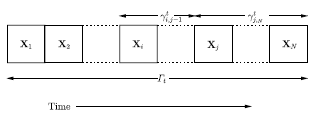TR2009-057
Fast Adaptive Algorithms for Abrupt Change Detection
-
- , "Fast Adaptive Algorithms for Abrupt Change Detection", Machine Learning, DOI: 10.1007/s10994-009-5122-x, Vol. 79, No. 3, pp. 283-306, July 2009.BibTeX TR2009-057 PDF
- @article{Nikovski2009jul2,
- author = {Nikovski, D.N. and Jain, A.},
- title = {{Fast Adaptive Algorithms for Abrupt Change Detection}},
- journal = {Machine Learning},
- year = 2009,
- volume = 79,
- number = 3,
- pages = {283--306},
- month = jul,
- doi = {10.1007/s10994-009-5122-x},
- issn = {0885-6125},
- url = {https://www.merl.com/publications/TR2009-057}
- }
- , "Fast Adaptive Algorithms for Abrupt Change Detection", Machine Learning, DOI: 10.1007/s10994-009-5122-x, Vol. 79, No. 3, pp. 283-306, July 2009.
-
MERL Contact:
-
Research Areas:

Abstract:
We propose two fast algorithms for abrupt change detection in streaming data that can operate on arbitrary unknown data distributions before and after the change. The first algorithm, MB-GT, computes efficiently the average Euclidean distance between all pairs of data points before and after the hypothesized change. The second algorithm, MB-CUSUM, computes the log-likelihood ratio statistic for the data distributions before and after the change, similarly to the classical CUSUM algorithm, but unlike that algorithm, MB-CUSUM does not need to know the exact distributions, and uses kernel density estimates instead. Although a straightforward computation of the two change statistics would have computational complexity of O(N4) with respect to the size N of the streaming data buffer, the proposed algorithms are able to use the computational structure of these statistics to achieve a computational complexity of only O(N2) and memory requirement of O(N). Furthermore, the algorithms perform surprisingly well on dependent observations generated by underlying dynamical systems, unlike traditional change detection algorithms.
Related News & Events
-
NEWS Machine Learning: publication by Daniel N. Nikovski and others Date: July 16, 2009
Where: Machine Learning
MERL Contact: Daniel N. Nikovski
Research Areas: Optmization, Data AnalyticsBrief- The article "Fast Adaptive Algorithms for Abrupt Change Detection" by Nikovski, D.N. and Jain, A. was published in Machine Learning.
